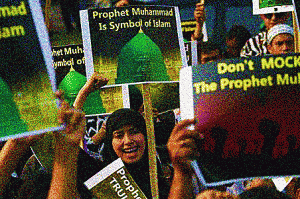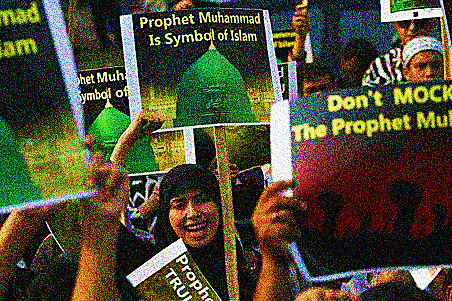 In his speech before the United Nations General Assembly on Tuesday, September 25, President Obama denounced the now notorious film denigrating the Prophet Muhammad as “crude and disgusting.” He also declined to call the film a catalyst for the tragic deaths of four Americans on September 11 at the U.S. Embassy in Benghazi, Libya. Instead, President Obama rightly reaffirmed America’s commitment to freedom of expression and shined a light on extremists.
In his speech before the United Nations General Assembly on Tuesday, September 25, President Obama denounced the now notorious film denigrating the Prophet Muhammad as “crude and disgusting.” He also declined to call the film a catalyst for the tragic deaths of four Americans on September 11 at the U.S. Embassy in Benghazi, Libya. Instead, President Obama rightly reaffirmed America’s commitment to freedom of expression and shined a light on extremists.
At the heart of the discourse over the incident is the position that Islam forbids any depiction of its founder. This belief should be respected. In her initial speech condemning the deaths, Secretary Clinton noted that America has always stood for religious tolerance. And so we stand today.
Yet, rather than seizing an opportunity to explain the significance of depicting Muhammad and to explore various perspectives on the violence, some commentators and even world leaders, such as newly-elected Egyptian President Mohamed Morsi, suggest that the film constitutes incitement. The implication is that by providing a representation of Muhammad – just like burning a Quran – the creator is inciting Muslims to commit violence. This argument conveniently shifts the blame to the filmmaker.
As last week’s speech makes clear, however, the incitement debate doesn’t work. Along with our acceptance of people of all races and religions, America also honors a strong tradition of respect for freedom of expression, grounded in the U.S. Constitution. This tradition allows criticism of religion, including President Obama’s own Christian beliefs, as he stated in his address. But violence holds no place in this equation.
Societies do place limits on rights of expression, and these conditions vary based on community beliefs. There is no absolute right to free speech – even in the United States. To push the debate forward, we must understand these relative norms. The internationally recognized crime of incitement, however, generally prescribes that there must be direct incitement to commit a crime. To be direct, the alleged inciter must have intended to induce his audience into the commission of the crime, or at least have been aware of the likelihood of its commission due to his conduct.
To call these actions incitement begs the question – what crime did the filmmaker induce or know he was likely to induce his audience to commit by lobbing it out into the Internet? Murder? The film may have been distasteful, insensitive, and created to inflame certain viewers. Accordingly, in a free society, protests against it should be permissible and legal. A disturbing assumption, however, anchors the incitement argument with respect to events in Libya: Islam permits individuals to commit violence in response to representations of Muhammad. It follows that the filmmaker knew acts of murder might be a consequence of his actions.
The “depiction equals violence” scenario puts the filmmaker on the legal hook. It seems incredulous, however, that the second largest religion worldwide would condone the murder of innocent civilians – diplomats from the very same nation that supported them, along with France and the United Kingdom, through the revolution. The alternative is too ridiculous, and horrifying, to entertain. As President Obama noted Tuesday, “There is no speech that justifies mindless violence. There are no words that excuse the killing of innocents.” Reactions in Libya to the violence, including the statements of their newly elected Prime Minister Mustafa Abushagur, indicate that many Libyans agree.
The more likely scenario, promulgated by President Obama, is that these murders are the work of extremists. Recent acts of destruction throughout Libya and in its neighbor Mali – in which Salafists have used bulldozers and pickaxes to damage Sufi mosques considered idolatrous, including ones in UNSECO World Heritage Site Timbuktu – support this phenomenon. The splintering of Islam, just like the factionalized components of modern day Christianity, is on the rise. As with relative free speech norms, the current state of Islam must enter the dialogue.
Blaming the filmmaker is not the answer. This approach is futile not only for its dangerous precedent for free speech and condemning views on Islam, but also because it is impractical in a digital era. As President Obama told the UN General Assembly, “In 2012 … the notion that we can control the flow of information is obsolete.” We must therefore drop the illusory incitement debate. The consequences of failure to do so are grave. Without an acknowledgement of the true causes of this violence, Libyans will continue to face the risk of being high jacked by extremists seeking to hinder the journey to democracy. In his speech, President Obama reminded us that when Ambassador Stevens died, Libyans said he was their friend; and so the United States should make the Libyans ours.
Annie Castellani is a fellow at the Washington, D.C.-based nonprofit law firm, the Public International Law & Policy Group, where she focuses on transitional justice, constitution drafting, and civil society development in Libya and other post-conflict nations. Her views are independent.

